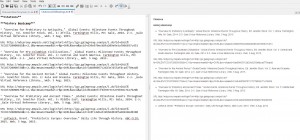There's an old joke that when an old man is asked directions by a passing motorist about how to get to the next town, the man answers "you can't get there from here." That story encapsulates my feelings for much software, especially our LMS. Witness my latest efforts:
I'm writing all my posts in Markdown so that I can publish them in multiple formats using Marked. The original txt files then aren't subject to weird formatting errors that happen with MS Word or bad html conversions. As a historian I also like the future-proof element of writing in plain text.
So I wrote up a citations page for the readings for week of my class, exported it as a PDF, and saved the PDF to our LMS. But the LMS likes to open pdf's in its own viewer, and that viewer doesn't always recognize links. Also, the viewer shrinks a full page to 1/3 of the computer screen, which makes reading a document an absurd exercise in magnifying and scrolling. Students can download the pdf, but it's an extra step. I'm looking for one-click usability. So, I switched the file to an HTML file that opens a new tab.
In other efforts, I realized the get-to-know-you quizzes I had in the LMS were cumbersome and wanted something more concise. So I thought, "I can export the quizzes as a CSV file right, and then build a google form?" Nope, I could only export xml, which would've required significant cleanup. For 35 questions, it turns out retyping was faster than actually using the LMS.
Increasingly I'm coming to value the flexibility and usability of tools outside our LMS and am thinking about how to offer these things to my students without turning my classes into an website account-creation hackathon. Single sign-in is important, but how important? If you can't get there from here, why stay here?
